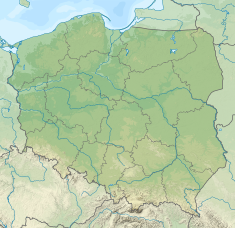Bełchatów Power Station
| Bełchatów Power Station | |
|---|---|

Bełchatów Power Station
|
|
| Official name | Elektrownia Bełchatów |
| Country | Poland |
| Location | Bełchatów, Łódź Voivodeship |
| Coordinates | 51°15′59″N 19°19′50″E / 51.26639°N 19.33056°ECoordinates: 51°15′59″N 19°19′50″E / 51.26639°N 19.33056°E |
| Status | Operational |
| Commission date | 1982 |
| Owner(s) | PGE |
| Operator(s) | PGE Elektrownia Bełchatów S.A. |
| Thermal power station | |
| Primary fuel | Lignite |
| Power generation | |
| Units operational | 12 x 370/380 MW 1 x 858 MW |
| Nameplate capacity | 5,420 MW |
| Annual gross output | 27–28 TWh |
|
Website elbelchatow |
|
The Bełchatów Power Station is a large 5,420 MWlignite-fired power station situated near Bełchatów in Łódź Voivodeship, Poland. It is the largest thermal power station in Europe, and second largest fossil-fuel power station in the world. It produces 27–28 TWh of electricity per year, or 20% of the total power generation in Poland. The power station is owned and operated by PGE GIEK Oddział Elektrownia Bełchatów, a subsidiary of Polska Grupa Energetyczna.
In 2011 a new 858 MW unit was commissioned and the total capacity of the power has risen to 5,053 MW. The new unit has an efficiency rating of approximately 42%, which is contributing to reduction of both fuel consumption and emissions compared to the existing units. The unit was built by Alstom. Alstom has also carried out the modernization of the low pressure parts in all 12 turbines and on 8 April 2009, PGE and Alstom signed a contract to modernise unit 6. After modernization of other units total installed capacity reached 5,420 MW in September 2015.
The station's exhaust is expelled through two 300 m (980 ft) tall chimneys, among Poland's tallest free-standing structures. Coal for the plant is provided by a large neighboring strip mine.
In 2007, the World Wide Fund for Nature ranked the power station as Europe's 11th most relatively polluting power station due to carbon dioxide emissions of 1.09 kg per kWh of energy produced, and the highest absolute emitter, with 30.1 million tonnes of CO2 per year. In July 2009, the facility was titled as the biggest carbon polluter in the European Union by the Sandbag Climate Campaign, a London-based non-profit organization. The report stated that the facility produced 30,862,792 tonnes of CO2 in 2008, and after commissioning the new unit, the whole generating capacity will have grown by 20%.
...
Wikipedia

